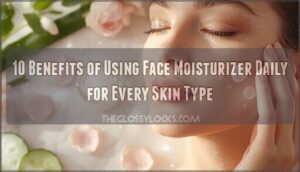This site is supported by our readers. We may earn a commission, at no cost to you, if you purchase through links.
 You’ll want to start with clean, damp skin when learning how to use jojoba oil for acne.
You’ll want to start with clean, damp skin when learning how to use jojoba oil for acne.
Apply 2-3 drops to your fingertips and gently massage into problem areas using circular motions. The oil mimics your skin’s natural sebum, which signals your pores to pump the brakes on oil production.
You can use it as a cleanser to dissolve stubborn makeup and dirt, or as a lightweight moisturizer that won’t clog your pores. For active breakouts, dab a tiny amount directly onto blemishes before bed.
Think of it as your skin’s peace treaty with excess oil. There’s actually a specific order and timing that maximizes results, making jojoba oil a valuable tool in achieving healthy skin.
Table Of Contents
- Key Takeaways
- How to Use Jojoba Oil for Acne?
- Applying Jojoba Oil Directly
- Unclogging Pores With Jojoba Oil
- Duration of Jojoba Oil Application
- Jojoba Oil Usage Before or After Washing
- Jojoba Oil as Acne Spot Treatment
- Incorporating Jojoba Oil as Natural Moisturizer
- Using Jojoba Oil for Treating Acne Scars
- Frequently Asked Questions (FAQs)
- How to use jojoba oil on face?
- Is jojoba oil good for acne?
- Is jojoba good for your skin?
- Is jojoba oil bad for your skin?
- Can jojoba oil be used as a skin cleanser?
- Can I put jojoba oil on my acne?
- Should I apply jojoba oil before or after moisturizer?
- Do you put jojoba oil on dry or wet skin?
- Can I use jojoba oil directly on my face?
- How do you unclog your pores with jojoba oil?
- Conclusion
Key Takeaways
- Apply jojoba oil to damp, clean skin to balance oil production, unclog pores, and reduce acne-causing bacteria.
- Use it as a lightweight moisturizer, or spot treatment for flexible integration into your skincare routine.
- Massage 2-3 drops directly onto problem areas to dissolve buildup and encourage healing without clogging pores.
- For deeper benefits, try overnight treatments or mix jojoba oil with clay masks or other oils like rosehip.
How to Use Jojoba Oil for Acne?
Three proven methods reveal jojoba oil’s acne-fighting power.
Oil cleansing removes impurities without stripping skin, while masking benefits emerge when mixing oils with clay.
Consider your skin type—oily or combination responds best to overnight treatment.
This natural acne remedy mimics your skin’s sebum, balancing oil production.
Olive oil, known for its antibacterial and moisturizing properties, offers another approach to acne treatment.
Start with these jojoba oil benefits for effective acne skincare.
Applying Jojoba Oil Directly
Applying jojoba oil directly to your face offers targeted acne treatment without complicated routines. Patch Test First – always test a small skin area before full application to avoid reactions. Skin Type Matters when determining how much oil you’ll need; oily skin typically requires just 2-3 drops, while dry skin may need slightly more.
After cleansing, warm the jojoba oil between your palms and gently press it onto acne prone skin. Jojoba oil’s composition, similar to human sebum production, makes it a beneficial addition to any routine.
The Application Time should be brief – let it absorb for 30 seconds before applying other products. Direct Application Frequency works best once daily, preferably at night. Layering Skincare becomes simpler since jojoba oil benefits include mimicking your skin’s natural sebum, making it compatible with most products while delivering effective jojoba oil face care.
Unclogging Pores With Jojoba Oil
Clogged pores don’t stand a chance against jojoba oil’s unique sebum dissolving power. This noncomedogenic oil works like a master key, using its wax esters to release stubborn blockages that cause breakouts.
Jojoba oil unlocks clogged pores like a master key, dissolving stubborn blockages that trigger breakouts naturally.
Jojoba oil’s molecular structure enables deep follicle penetration, where it dissolves excess sebum and debris trapped in your pores. Unlike harsh scrubs that can irritate, this gentle oil for acne mimics your skin’s natural oils, promoting healthy oil regulation without triggering increased production. Although it’s often recommended, there’s limited research available on its effectiveness for acne.
Here’s your step-by-step pore-unclogging routine:
- Massage method: Apply 3-4 drops to dry skin, massaging in circular motions for 2 minutes
- Steam treatment: Use warm towel over oiled face to open pores further
- Gentle removal: Wipe away with damp cloth, avoiding aggressive rubbing
- Follow-up cleanse: Use mild cleanser to remove residual oil and loosened debris
This acne treatment approach helps reduce pore size appearance while preventing future poreclogging without over-drying your skin.
Duration of Jojoba Oil Application
Now that you understand how jojoba oil works to unclog pores, you’re probably wondering how long to leave it on your skin. The answer depends on your specific acne treatment goals and skin sensitivity.
For daily application frequency, start with 15 seconds of gentle absorption time when using jojoba oil as a moisturizer. This allows your skin to drink up the benefits without overwhelming your pores.
When doing spot treatment length applications, you can leave the oil on problem areas for 10-15 minutes before gently patting away excess. Jojoba oil also contains beneficial antibacterial properties that can help fight acne-causing bacteria.
Mask application time varies based on your mixture. Clay masks with jojoba oil work best for 10-15 minutes, twice weekly. For overnight jojoba treatments, apply a thin layer before bed and let it work its magic while you sleep.
Rinse-off duration isn’t always necessary – jojoba oil absorbs well and doesn’t require washing off unless you’re using it as a cleanser in your skin routine.
Jojoba Oil Usage Before or After Washing
Timing your jojoba oil application correctly can make or break your acne treatment results.
The beauty of this facial oil acne solution lies in its versatility—you can use jojoba oil both before and after washing your face. Application timing depends on your specific skin needs and desired cleansing synergy.
Here’s how to maximize oil absorption and skin hydration:
- Pre-cleanse method: Massage jojoba oil cleanser onto dry skin to dissolve stubborn makeup and excess sebum
- Post-wash moisturizer: Apply thin layer on clean, damp skin for enhanced jojoba oil moisturizer benefits
- Double cleansing: Use before your regular cleanser, then follow with gentle face wash
- Wash frequency consideration: Apply after every cleansing session to maintain skin barrier protection
To enhance absorption, consider that clean hair absorbs better.
Jojoba Oil as Acne Spot Treatment
Targeted Application of jojoba oil transforms stubborn breakouts into manageable spots. You’ll want to cleanse your face first, then dab a single drop directly onto each pimple using a clean cotton swab. This facial oil acne approach works because jojoba oil’s anti-inflammatory properties reduce redness while its antimicrobial effects fight bacteria.
Patch Testing prevents unwanted reactions – apply a small amount behind your ear and wait 24 hours. For Overnight Treatment, leave the oil on affected areas while you sleep, allowing skin healing compounds to work their magic.
Frequency Guidelines suggest spot-treating 2-3 times daily for ideal results. Dilution Ratios aren’t necessary since pure jojoba oil is gentle enough for direct application. For faster results, consider benzoyl peroxide treatments alongside jojoba oil. This method of treating acne naturally provides concentrated relief exactly where you need it most, without overwhelming your entire complexion.
Incorporating Jojoba Oil as Natural Moisturizer
Your skincare routine deserves a game-changer that won’t betray your acne-prone skin. Jojoba oil stands as your Sensitive Skin Savior, delivering Hydration Without Clogs thanks to its noncomedogenic properties. This liquid wax mimics your skin’s natural sebum, promoting sebum regulation without triggering breakouts.
*Transform your acne-prone skin with nature’s perfect sebum mimic – jojoba oil delivers hydration without the breakout betrayal.
Jojoba oil also contains properties that fight scalp infections.
Here’s your step-by-step moisturizing routine:
- Cleanse thoroughly – Remove dirt and impurities before applying jojoba oil
- Warm 3-4 drops – Rub between palms to activate the oil’s penetrating power
- Massage gently – Use upward circular motions, focusing on dry areas
- Allow absorption – Wait 5-10 minutes before applying makeup or sunscreen
Mixing With Other Oils like rosehip can enhance benefits, while an Overnight Moisturizing Mask treatment works wonders for severely dehydrated skin.
The Jojoba Oil Benefits include balanced oil production and improved skin texture. Unlike heavy creams that suffocate pores, this natural moisturizer absorbs quickly, leaving your complexion refreshed and protected.
Using Jojoba Oil for Treating Acne Scars
Beyond moisturizing, jojoba oil tackles acne scars with impressive results. This natural powerhouse contains high levels of vitamin E benefits that jumpstart your skin’s repair process.
Different scar types respond well to jojoba’s wound healing properties, whether you’re dealing with raised, depressed, or discolored marks.
For ideal scar fading, massage 2-3 drops directly onto scars twice daily. The application frequency matters – consistency beats intensity every time.
Jojoba oil stimulates collagen boost production, which fills in textured scars over time. It also addresses hyperpigmentation through gentle skin lightening effects.
Consistent massage can also help improve circulation and soften scar tissue. Reducing acne scars takes patience, but you’ll notice softer texture within 4-6 weeks.
For stubborn marks, mix jojoba with rosehip oil to supercharge the healing process. Remember, fresh scars respond faster than old ones.
Frequently Asked Questions (FAQs)
How to use jojoba oil on face?
Cleanse your face first, then apply 2-3 drops of jojoba oil to damp skin.
Gently massage in circular motions until absorbed.
You can use it morning or evening as a lightweight moisturizer.
Is jojoba oil good for acne?
Can nature’s liquid gold be your skin’s savior?
You’ll find jojoba oil exceptionally effective for acne since it mimics your natural sebum, balancing oil production while delivering anti-inflammatory and antibacterial benefits.
Without clogging pores, it provides a unique solution, making it an excellent choice for skin care, offering anti-inflammatory benefits.
Is jojoba good for your skin?
Yes, jojoba oil’s excellent for your skin.
It mimics natural sebum, balances oil production, and won’t clog pores.
You’ll get anti-inflammatory benefits, wound healing properties, and moisture without greasiness—perfect for most skin types.
Is jojoba oil bad for your skin?
No, jojoba oil isn’t bad for your skin.
It’s actually beneficial since it’s noncomedogenic, meaning it won’t clog pores.
You’ll find it mimics natural sebum, helping balance oil production and reduce acne.
Can jojoba oil be used as a skin cleanser?
This miracle liquid wax dissolves makeup and sebum like magic.
You’ll massage it into your skin, then wipe away impurities with a warm washcloth.
It cleanses without stripping your skin’s natural protective barrier.
Can I put jojoba oil on my acne?
You can safely apply jojoba oil to acne.
Its noncomedogenic nature mimics skin’s sebum, helping balance oil production.
Plus, it’s antibacterial and anti-inflammatory, reducing redness and breakouts while promoting healing—just don’t overdo it!
Should I apply jojoba oil before or after moisturizer?
Think of jojoba oil as your skin’s wingman—apply it before moisturizer.
This lets it penetrate deeply, balance oil production, and prep your skin.
Then, seal the deal with moisturizer to lock in hydration.
Do you put jojoba oil on dry or wet skin?
Apply jojoba oil to slightly damp skin for better absorption.
Damp skin helps lock in moisture and enhances the oil’s benefits.
After cleansing, pat your face gently, leaving it a bit moist before applying jojoba oil.
Can I use jojoba oil directly on my face?
Yes, you can apply jojoba oil directly to your face.
Massage a few drops onto clean, dry skin.
Its noncomedogenic nature guarantees it won’t clog pores, while balancing oil production and soothing inflammation.
How do you unclog your pores with jojoba oil?
Think of jojoba oil as a locksmith for your pores.
Massage a few drops onto clean skin; its sebum-like structure dissolves trapped oils and debris, unclogging pores while keeping your skin balanced and hydrated.
Conclusion
As the saying goes, "Slow and steady wins the race," and that applies to managing acne with jojoba oil too.
By understanding how to use jojoba oil for acne, you can harness its ability to balance your skin’s oil production, cleanse pores, and soothe breakouts.
Whether as a cleanser, spot treatment, or moisturizer, it’s adaptable to your routine.
Be consistent, patient, and mindful, and you’ll be on your way to clearer, healthier skin in no time.
- https://www.medicalnewstoday.com/articles/321665
- https://www.reddit.com/r/SkincareAddiction/comments/186v7xx/acne_does_jojoba_oil_cause_acne/
- https://www.mustelausa.com/blogs/mustela-mag/benefits-of-jojoba-oil
- https://jojobacompany.com/can-you-use-jojoba-oil-for-acne/
- https://www.cosmeticsandtoiletries.com/research/literature-data/news/22499200/jojoba-desert-jojoba-desert-releases-results-of-jojoba-oil-on-sebum-reduction-antiacne








